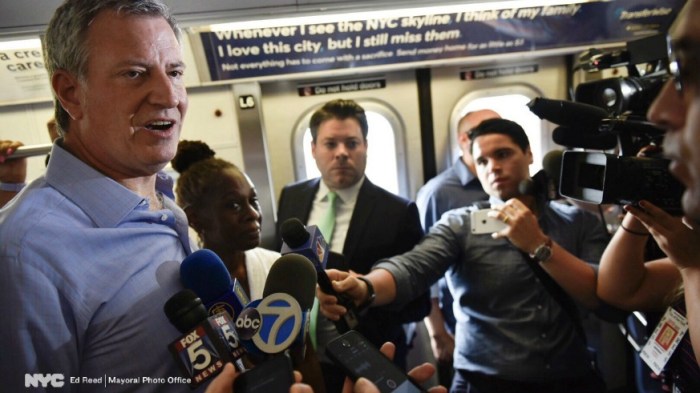Gov. Andrew Cuomo and Mayor Bill de Blasio seem to have found a new thing to agree on: Times Square’s “desnudas” need to go. What they can’t agree on, however, is whether the bare-chested ladies are actually breaking any laws.
RELATED: Mayor considers topless women in Times Square ‘unacceptable’ “I believe this activity is illegal,” Cuomo, a former state attorney general, said on NY1 Wednesday morning. “I think it is infringing on the investment that the state and the city made [in Times Square] … and I think it has to be stopped.” The governor’s office did not immediately respond to Metro’s request for details on exactly what laws the topless, body-painted women might be breaking.
A noted civil rights attorney, Norman Siegel, told Metro he respectfully disagreed with Cuomo’s statement given what is publicly confirmed about the women in Times Square.
Siegel explained that there’s nothing necessarily illegal with passive panhandling, whereby a person sits on public property without blocking doors or pathways.
RELATED: Lawmakers look to regulate Elmo, Spider-Man and other Times Square costumed characters There’s also nothing explicitly illegal about buskers asking passersby for tips — not unlike the costumed characters sharing stretches of Times Square with the women — nor does just being topless in New York break any laws. Both acts, Siegel added, can be considered illegal if the busker is aggressively demanding money for performance or if a person feels harassed by the performer.
On Tuesday, de Blasio committed to work with the City Council to crack down on the nearly nude women even as City Hall admits to concerns about the women’s Constitutional rights.
“This is a situation that I don’t accept,” de Blasio told reporters. “And we will deal with very aggressively.”
But Siegel advised both state and city lawmakers offer a softer touch before they start drafting new laws and punish panhandlers.
“Officials should first attempt to educate and inform people of what rights they have and what they can’t do,” he said. “They’d be surprised to see that people might heed most or all of what they’re asking for.”
Cuomo calls Times Square topless panhandler activity ‘illegal’

Spencer Platt/Getty Images

















